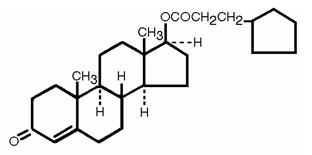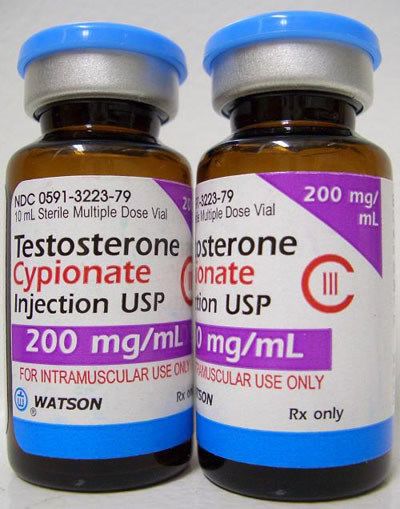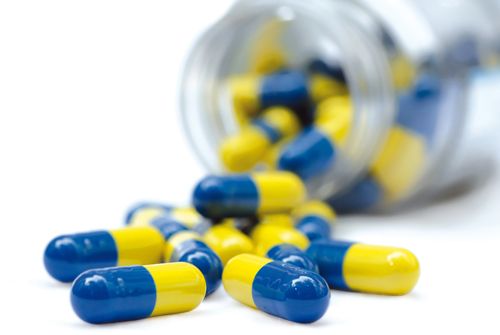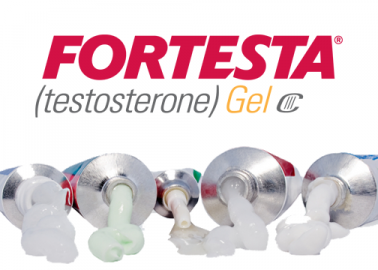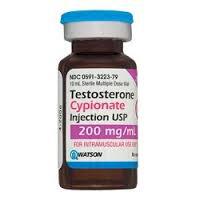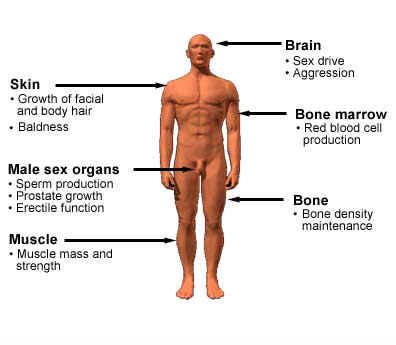Testosterone Test
Low T Testing (FFTB) Measures Free Testosterone Levels. Total Testosterone vs Bio-Available T Levels, SHBG, Low vs. Normal Androgen Blood Serum Levels
Get Tested for Low T Levels and obtain the best Testosterone products available online with a prescription safely and legally. FDA approved Testosterone Drug Medications may be purchased with a doctor's prescription for Testosterone Replacement Therapy.
TestosteroneTherapyClinics.com is the best Male Hormone Replacement Therapy and Testosterone Treatment resource for men online because our medications used for male hormone replacement therapy are genuine steroid hormones, not anti-aging pills, not imported anabolic steroids, but real Testosterone, real Human Growth Hormone (Somatropin) real Trimix and Bimix formulations, and pharmacy-grade prescription Testosterone products!
Low T (Andropause) is characterized by very low energy levels, low or lost sex drive and reduced sexual function, flabby muscles, increased belly fat, rapid weight gain, feeling tired all day, wide mood swings, night sweats, hot flashes in men, bursts of anger, social withdrawal, sleep problems, loss of focus and memory, sadness and depression.
A Tesosterone Deficiency
can be caused by age, injury, or pituitary failure known as hypogonadism. Age-related testosterone decline can occur in middle aged and older men and is referred to as Andropause or "male menopause".
Erectile Dysfunction or ED
is characterized by the inability to achieve or maintain an erection firm enough or long enough to engage in sexual intercourse. Soft or weak erections, less frequent erections, loss of morning or spontaneous erections, and premature ejaculation are symptoms of male impotence which may require medical treatment.
Why get a Testosterone Test?
You should consider getting a Low Testosterone Test
when you think you may have symptoms associated with androgen hormone deficiency.
Testosterone levels decline with age
and with certain endocrine disorders, illness and injury to the testes or pituitary gland in the brain.
A man with age-related testosterone decline
may have a form of hypogonadism referred to as Andropause, the male menopause. The only way to know if your T levels are deficient, is to have a Testosterone Test, also called a blood serum testosterone panel. The androgen lab test panel measures:
- Total Testosterone
- Free Testosterone
- Bio-Available Testosterone.
Low T Physicians and Urologists
may order the blood serum testosterone test in cases where a man's or women's health is impacted by:
- Too little testosterone
- Too much testosterone
- Primary hypogonadism
- Secondary hypogonadism
- Testicular injury
- Delayed puberty
- Treating breast cancer
Low T Test Analysis
What forms of testosterone do doctors test
and how do they analyze the results? The results of a blood serum test will measure Total Testosterone and its components: SHBG Bound Testosterone; Albumen Bound Testosterone; and Free Testosterone.
Albumen Bound + Free Testosterone = Bioavailable Testosterone
SHBG Bonded Testosterone:
This form of androgen hormone is bonded with sex hormone binding globulin (SHBG), a protein that renders the testosterone biologically inactive. Bonded Testosterone is the most common type and makes up about 65 percent of total testosterone circulating in the bloodstream.
Because the bound testosterone is attached to SHBG and the protein cannot easily be separated from the androgen hormone, it is not considered Bioavailable. Testosterone that is Free or Bioavailable is the only form of androgen that can be used by the body.
Bioavailable Testosterone
is comprised of Free Testosterone and Albumin Bound Testosterone. These are the most significant elements to be measured in a Low T Lab Test.
Albumin bound androgen
is temporarily bonded to the protein albumin and comprises about 35 percent of the total testosterone in the body. Bioavailable testosterone is considered to be potentially bioavailable because it can eventually break away from the albumin protein and become bioactive in the body.
Free Testosterone
is not attached to any protein, not SHBG or albumin. Free testosterone makes up about 2 percent of Total T and is the form that is completely bioavailable to be used by the body. Free testosterone travels freely through the bloodstream and can is completely available to bind to the androgen hormone receptors in the tissues.
Getting your testosterone levels checked your doctor.
After you take a testosterone blood test that measures your androgen blood serum levels, your doctor will give you the results represented by three different lab reference numbers that comprise Total Testosterone.
Total Testosterone Levels are not the same as Optimal Testosterone Levels.
Total T represents the entire amount of testosterone that is circulating throughout the body, so it includes SBHG bound Testosterone, Albumin bound Testosterone plus unbound or Free Testosterone. Total Bioavailable Testosterone consists of Albumin bound plus Free Testosterone. It is the Total BIOAVAILABLE Testosterone that physicians need to focus on when considering optimal levels, androgen deficiency and formulating a TRT program.
The male hormone, testosterone,
is associated with masculinity and male charcteristics. However, women's bodies also make testosterone although usually 10 to 20 times less than men. Too little testosterone in men or too much in women can indicate a serious health condition that can cause symptoms. It can also create a health risk and hormonal traits that are considered abnormal for your gender.
The testicles make testosterone in men using specialized cells (Leydig Cells), and in women, the ovaries and adrenal glands produce the androgen hormone in small quantities. Testosterone is responsible for a healthy sex drive in both sexes, and the main male characteristics in men such as deep voice, body hair, muscle mass, bigger bones and greater strength. Men with low levels of testosterone might notice a reduction in energy, muscle mass, sex drive, and increase in body fat and weight, moodiness and depression.
Too little testosterone in women can reduce libido and sexual arousal. Too much testosterone in women can cause male traits to be more exaggerated. Learn more about Testosterone for Women.
You may want to take a testosterone level test if you believe your testosterone levels aren’t within a normal range and you have symptoms you think are caused by Low T levels.
What is a normal testosterone level?
NORMAL TESTOSTERONE LEVELS
Normal vs Abnormal Androgen levels. A normal testosterone-level range for men is 300ng/dL to 1,000 nanograms per deciliter (ng/dL). For women, it’s between 15ng/dL and 70 nanograms per deciliter.
Sometimes, these are referred to as Testosterone Lab Reference ranges, and in some cases a person's testosterone level may be considered "normal", but the person still has symptoms of androgen deficiency. This can happen because the Free Testosterone or Bio-Available Testosterone levels are low as compared to the Total Testosterone.
Is Testosterone decline normal?
Yes, as men and women age, their T levels naturally decline over time. It's normal for you to have changes to your level of testosterone throughout your life and even at different times of the day. The normal level of testosterone are reflected by two main lab reference charts as follows:
LAB REFERENCE CHART 1
Males (ng/dl) 240-950
Females (ng/dl) 8-60
LAB REFERENCE CHART 2
Males (ng/dl) 300-1,070
Females (ng/dl) 15-70
Testosterone levels can decrease naturally
due to your age or other health conditions. After the age of 40, men’s testosterone levels usually decrease about 1% to 2% each year. Some symptoms of low testosterone, particularly ED erectile dysfunction, are commonly seen in men over 40 but can occur as young as 35. Low testosterone levels have often been observed in people who use anabolic steroids, have diabetes or are obese, regardless of age.
The most common testosterone-related problem in men is hypogonadism, also called low testosterone. The two types of hypogonadism are Primary and Secondary. Primary can be caused by illness or injury to the testicles and is also known as "primary testicular failure". Secondary indicates a pituitary problem that originates in the hypothalamus which is the brain that signals the testicles to produce testosterone via the hormones LH (Luteinizing Hormone) and FSH (Follicle-stimulating hormone).
Your testosterone levels may be abnormally low if you have one or more of the following symptoms:
- decreased sex drive or sexual function
- inability to achieve an erection (erectile dysfunction)
- inability to conceive a child due to infertility
- extreme fatigue and feeling tired all day
The Endocrine Society has Low T Symptom guidelines that help physicians determine androgen deficiency.
- low or lost libido
- erectile dysfunction
- low sperm count
- loss of body hair
- hot flashes in men
- poor concentration and memory
- feeling sad or depressed
- insomnia or disturbed sleep
- decreased energy and
- loss of motivation, drive or self-confidence
- diminished ability to perform physical work
- reduced muscle bulk and loss of strength
- increased body fat or rapid weight gain
- bone loss, weak bones or Osteoporosis
Abnormally high or low levels of testosterone in men and women can indicate other serious conditions. High T levels can indicate ovarian or testicular cancer. Low T levels can indicate chronic illness or a problem with the pituitary gland, which releases hormones.
In infant boys and girls, signs of abnormal testosterone levels may be more extreme. Testosterone tests are often ordered for boys and girls who aren’t developing properly or when parents notice delayed puberty in either boys and girls.
Boys with low T may grow slowly, with no body hair and poorly developed muscles. Girls with high T may have delayed menstruation or too much body hair. Boys with high T may enter puberty early and robustly. Women with too much T may grow facial hair, develop a deeper voice, or experience decreased breast size.
Too much T in can also cause over-aggressiveness, acne and oily skin.
Lab Testing Facilities vs at Home Low T Testing or Saliva Kit Testing
Check Your Testosterone Level with an At-Home Test Kit. The Home Test Kits for Testosterone help to measure androgen levels associated with abnormally low or high testosterone and is a self-test kit. Although it is quite affordable and easy to use, it is simply not comprehensive enough of a testosterone test for properly diagnosing and prescribing a Testosterone Replacement Therapy program.
TESTOSTERONE TESTING
How is a testosterone test performed?
Getting testosterone levels checked requires a simple blood test. The test is usually performed in the morning, when T levels are highest. Sometimes, the test needs to be retaken on another day to confirm the initial blood serum measurements.
Before the test, your doctor may ask you to stop taking any prescriptions that could affect your testosterone levels. Some medications that can artificially increase your testosterone levels include:
- steroids
- barbiturates
- anticonvulsants
- androgen or estrogen therapies
- Some prescription drug medications, including opiates, can artificially decrease your testosterone levels making it difficult to ensure your testosterone test results are accurate.
If you are in need of testosterone replacement and depending on your symptoms, your doctor will order a physical examination. If you’re male, your doctor may perform a physical if they notice:
- a loss of facial or body hair
- infertility or low sperm count
- a loss of height or Osteoporosis
- signs of gynecomastia, an abnormal increase in breast tissue in men (man boobs)
- rapid or excessive weight gain
If you’re female, your doctor may perform a physical if they notice:
abnormal facial acne
abnormal hair growth on your lips or chin (hirsutism)
abnormal hair thinning or balding on the head
Laboratory testosterone blood testing offers the most accurate measurement of testosterone levels. This is especially true when diagnosing male hypogonadism.
Even when salivary testing is used, testosterone serum testing is necessary to ensure that salivary test results are accurate.
What else might be impacting my testosterone levels?
Liver problems, prescription drugs and alcohol abuse can lower the amount of testosterone in your body. Too much estrogen in the blood can also negatively testosterone levels.
TREATING LOW T LEVELS
How can I treat my low testosterone levels?
Talk to your doctor about testosterone testing
if you suspect that you have abnormal hormone levels. A wide range of treatment options are available.
The most common treatment
for low testosterone is testosterone replacement therapy (TRT). With TRT, you’re given an injection, a skin patch, or a
topical androgen gel
or cream containing testosterone that replaces the natural testosterone missing from your body. Though this steroid hormone treatment is common for treating male hormone problems, male impotence symptoms, FSD (Female Sexual Dysfunctions) and breast cancer in women, TRT is known to have some risks and side effects. Side effects include:
- oily skin
- sleep apnea
- severe acne
- blood clot formation
- benign prostatic hyperplasia, or prostate growth
- possible increased risk of heart attacks and stroke
- If you’re taking any medications or supplements (such as anabolic steroids) that abnormally affect your testosterone levels, your doctor may ask you to stop taking them or suggest an alternative.
Your doctor may also recommend lifestyle changes that can help balance your testosterone levels, such as diet, stop smoking, exercising to build muscle and weight loss.
If you notice any abnormal symptoms, such as lack of sexual desire, fast weight gain, hair loss, hot flashes, muscle loss or depression, especially if you’re under 40, you may want to test your testosterone levels. A test can help reveal whether any underlying conditions, health issues, or lifestyle choices are affecting your testosterone natural production.
In many cases, testosterone levels can vary based upon your age, diet, prescription drug or alcohol intake, stress levels, weight and level of physical activity. A testosterone test may indicate that your low levels are a result of the natural aging process.
How Low T Testing Works
Testosterone Testing ProcedureChecking your testosterone level is an important part of maintaining male health and female health. Abnormally high and low levels can cause some hormonal symptoms and other health issues, such as low sex drive (low libido), insomnia, hot flashes, weight gain, depression, irritability and reduced physical performance.
Some health issues that arrive with low testosterone (Low T) include:
- Injury to the testicles
- Testicular cancer or treatment for testicular cancer
- Hormonal disorders
- STIs
- Chronic liver or kidney disease
- Type 2 diabetes
- Obesity
Who should take the Testosterone Test?
As men and women age, it’s important that they are aware of how this essential hormone functions within their body. Maintaining optimal hormone levels is key to staying healthy over one's lifetime. Symptoms of low testosterone can be treated and more serious complications can be prevented when you test your testosterone level.
Low testosterone levels can occur in men of any age, but are most common in men over 35. An underlying health condition such as obesity, pituitary gland issues, steroids, medicines, alcohol use and injuries can impact healthy testosterone levels.
If you are experiencing one or more symptoms of low testosterone, contact a
Testosterone Physician Online
for recommendations that can help determine if testosterone testing is right for you.
How much does a Low T Blood Test cost?
How much does a Testosterone Test Cost?
A Testosterone Blood Test ranges from $200 to $400 depending upon whether a basic serum T test is ordered, or a comprehensive hormone panel is ordered which measures other hormones such as HGH Human Growth Hormone, cortisol, and lipids.
Many Low T Clinics and Urologists offer blood testing at their office or a lab test can be performed at a local LabCorp, Concentra, Quest Diagnostics, Access Labs or Urgent Care.
Testosterone Blood Work pricing at the local lab can range anywhere from $175 for one simple test, to $3,500 for several complex hormonal tests.
Does insurance cover Testosterone Tests?
Depending upon your insurance company, some will reimburse you for the full cost of the blood work, others only reimburse part of the cost.
To get blood work done at a local lab when you are uninsured usually costs on average around $500 to $1,000.
Saliva Testing vs Blood Testing for Low Testosterone
Testing for a Testosterone Deficiency
Male Anti-Aging Hormone Panel
A comprehensive male hormone panel
provides your treating physician with all the information required to make an accurate diagnoses and formulate a successful TRT Program which will give you the best possible results. A comprehensive Testosterone Test includes the following panels:
Testosterone Blood Serum Panel:
Free, Albumen Bound & Total Testosterone - The blood serum concentration of bioavailable testosterone helps your doctor ascertain your ability to maintain energy levels, good bone density, proper fat distribution, muscle strength, healthy sex drive and function, fertility (sperm production), mood and drive.
SHBG Test Panel:
The SHBG blood test, is a sex hormone-binding globulin lab test that measures the SHBG blood serum level. SHBG is a transport protein for androgen and estrogen hormones. SHBG is produced in the liver and binds to testosterone and estradiol preventing these sex hormones from exerting overburdening effects on the tissues. As a result, abnormally high SHBG levels can result in insufficient amounts of bioavailable testosterone and estradiol in the blood serum leading to a deficiency in these hormones.
Metabolic Panel
- measures bio-markers to help evaluate cardiovascular health, metabolic function, lipids, electrolytes, minerals, bone health, kidney and liver function.
Complete Blood Count (CBC)
- The CBC test measures red blood cells, white blood cells, and platelets which help your doctor assess your immune system, any infection, anemia or blood disorder, clotting ability, and vascular health.
DHEA Panel
and Dehydroepiandrosterone sulfate (DHEA-S) - DHEA is an androgen steroid hormone produced by the adrenal glands. Low DHEA can contribute to loss of fertility, and is a measure of adrenal gland health.
Prostate Specific Antigen (PSA)
- PSA is produced by cells of the prostate gland. Used in together with a digital rectal examination, PSA is a useful screening test for benign prostate hyperplasia (BPH) and potential prostate cancer development.
Estradiol (E2)
- The female sex hormone estradiol is a form of estrogen that is also present in men. In males, high levels of estradiol are associated with excessive adipose abdominal fat, enlarged prostate, gynecomastea (male breasts) and increased cardiovascular risk. Estrogen levels and testosterone levels that are too low are associated with Osteoporosis.
Homocysteine
- helps your doctor assess risk factors for cardiovascular disease.
High homocysteine levels can damage the interior of the arteries resulting in vascular inflammation, arterial plaques, and blood clots.
C-reactive protein
(High sensitivity) - CRP measures inflammation in your body. Inflammation places you at risk for diseases like heart disease, liver and kidney ailments, premature aging and stroke.
Thyroid & TSH (Thyroid stimulating hormone)
- TSH is produced by the pituitary gland, and stimulates your thyroid to produce thyroid hormones T3 and T4. TSH can be used to screen for thyroid disease and other thyroid imbalances.
Vitamin D, 25-Hydroxy
- Vitamin D is essential to every cell and tissue throughout the body but the human body does not make its own Vitamin D. It is needed for proper immune function, bone mineralization, cardiovascular, brain health and mood stability.
Hemoglobin A1C (HbA1C)
- HbA1C shows the average level of blood sugar (glucose) over the previous 3 months. HbA1C is a useful indicator of how well blood glucose is being controlled, and is also used to monitor the effects of diet, exercise, and drug therapy in diabetic patients.
Apolipoprotein B (ApoB)
- ApoB is a protein that assists in the metabolism of lipids and is the main protein in non-HDL cholesterol in your bloodstream. The greater the number of these proteins, the more cholesterol can be deposited in the artery walls leading to vascular disease and risk of heart attack.
IGF-1 Lab Panel: The IGF test, is also known as the Growth Hormone IGF lab test. IGF-1 blood test or insulin-like growth factor test, and the somatomedin C test, measures the IGF-1 blood serum level.
IGF-1 is a protein hormone
produced by the liver and is involved with the growth and repair of tissues, organs, muscle and bones in the body. IGF-1 levels increase in the presence of human growth hormone (HGH). Dietary protein also stimulates an increases in IGF-1 production. IGF-1 blood levels are measured to help test for human growth hormone deficiencies caused by hypopituitarism or age-related hormone deficiency during menopause and Andropause.
HGH Blood Test Panel: Human Growth Hormone level vary throughout the day, whereas IGF-1 blood levels are relatively stable. Because of this, IGF-1 blood testing is performed in together with growth hormone lab testing.
The Human Growth Hormone Test,
or GH Lab Test Panel, is an HGH Test used to determine if a growth hormone deficiency exists in children and adults.
HGH blood testing
or a growth hormone blood test measures the current growth hormone blood serum level. In order to qualify for Hormone Replacement Therapy using Bio-Identical HGH or Somatropin, patients must undergo HGH testing.
Growth hormone (GH)
is a hormone and amino acid protein with anabolic effects that is essential to in cell generation, regeneration and tissue growth, protein and glucose synthesis and a healthy metabolism.
HGH is also known as somatotropin (STH) or Human Growth Hormone (hGH). Natural or endogenous Growth Hormone is secreted by the pituitary gland and regulated by hormones made in the hypothalamus which releases pulses of HGH from the pituitary every four hours, and during sleep at night.
HGH stimulates the liver
to increase blood serum levels of IGF-1 which promotes cell, tissue, muscle and bone growth as well as healing and repair. Low HGH levels can cause growth problems in children (GHD), and in adults with AGHD (Adult Growth Hormone Deficiency, a loss of libido, muscle loss, weakness and low energy, increase in adipose body fat, rapid weight gain, skin wrinkling, dry hair and brittle nails, hot flashes, night sweats, mood swings, memory loss, insomnia and depression.
IGFBP-3 Test Panel: IGF-1 is carried through the bloodstream by IGFBP-3 and the test is used to evaluate how well IGF-1 is being transported through the body.
Why test my Testosterone levels?
Why Get Tested for Low T?
Testosterone is the male sex hormone
produced by the testicles and is responsible for the proper development of primary and secondary male sexual characteristics. Testosterone works with HGH (Human Growth Hormone) to build and maintain strong muscles and bones. Testosterone is essential to make sufficient levels of red blood cells, mental acuity and memory, prevent osteoporosis, maintain fertility and sexual function.
Insufficient production of natural testosterone is a common cause of erectile dysfunction in men because enough bio-available testosterone is required for a man to have and sustain an erections. For this reason many Urologists and Male Anti-Aging Physicians may order a Testosterone Test to decide if they need to prescribe Testosterone Replacement Therapy for ED.
LabCorp is one of the best Testosterone Labs in the United States. They suggest getting tested to help diagnose sex hormone deficiency:
"To detect an abnormal testosterone level in males and females."
In males, to help diagnose the cause of erectile dysfunction or the inability of your partner to get pregnant (infertility). When you may be infertile or are unable to get or maintain an erection due to ED (Male Impotence Symptoms); when you are a boy with either early or delayed sexual maturity (puberty).
In females, to help diagnose the cause of masculine physical features (virilization), infertility, or polycystic ovary syndrome (PCOS); In cases of FSD Fenale Sexual Dysfunction or inability to get aroused due to lower than normal testosterone levels. When you have male traits, such as a low voice or excessive body hair (hirsutism), when you have abnormal uterine bleeding, do not menstruate (amenorrhea), or are infertile.
What is the cause of Low Testosterone in Men?
What exactly causes testosterone deficiency in men?
As a men ages, the amount of testosterone in his body declines at a rate of 1% to 2% per year. This natural decline starts after age 30 to 35 and continues through middle age until natural androgen levels become so low that symptoms begin to appear. Other causes of naturally low testosterone levels include:
- Pituitary malfunction.
- Increases in Sex Hormone Binding Globulin (SHBG).
- Malfunction of the Leydig Cells (Testosterone Producing Cells).
- Injury to the testes or an infection, or loss of the testicles.
- Chemotherapy or radiation treatment for cancer.
- Klinefelter's Syndrome.
- Hemochromatosis.
- Chronic illness.
- Kidney disease.
- Liver disease.
- Diabetes.
- Obesity.
- Stress.
- Alcoholism and Drug Abuse
- Certain Prescription Drug Medicines
Symptoms of Testosterone Deficiency
What are the symptoms of testosterone deficiency (Low T)?
Without enough testosterone a man loses his sex drive, may have symptoms of male impotence (Erectile Dysfunction), feels lethargic and tired all the time, feels irritable and depressed. Without ample testosterone, physical activities, muscle building and exercise become difficult. Lapses in memory, inability sleep through the night, moodiness and bouts of anger become common place.
What physical changes occur in the body due to testosterone deficiency?
One of the first things that becomes noticeable is a decrease in muscle tone and lean muscle mass, along with with a marked increase in adipose body fat and excessive weight gain, especially around the belly (beer belly).
Changes in cholesterol levels, especially in bad cholesterol levels.
A decrease in hemoglobin can cause mild anemia, and many men with a testosterone deficiency feel extremely tired all day, even falling asleep in the middle of the day or right after a meal.
Low T causes weak bones or Osteoporosis. The body needs both enough HGH and Testosterone along with Vitamin D, calcium and magnesium to build and maintain strong, healthy bone.
Sexual function becomes problematic as male impotence symptoms and premature ejaculation become the norm. This negatively effects many men's personal relationships and ability to become intimate
How a doctor diagnoses a testosterone deficiency?
Low T Testing. The only accurate way to determine a testosterone deficiency is to have your urology doctor measure the amount of testosterone in your blood. Because testosterone levels fluctuate throughout the day, you should fast before your lab test and several measurements may need to be taken to properly detect a hormone deficiency. Doctors prefer, if possible, to test T levels early in the morning since this is when testosterone levels are at their highest.
How is male testosterone deficiency treated?
Testosterone deficiency is normally treated with a form of TRT:
- Intramuscular Injections, generally 250mg to 500mg every two or three weeks
- Testosterone Patch worn either on the body or on the scrotum
- Topical Testosterone Gel applied to the skin daily
- Transdermal Testosterone Cream applied to the skin daily
- Buccal Gum Adhesive material applied above the teeth twice a day
- Androgen hormone pellets inserted at the doctor's office
Each of these Low T options provides adequate levels of hormone replacement for men with a clinical androgen deficiency. Each treatment option has advantages and disadvantages. Talk to your HRT doctor to see which TRT program is right for you.
CAS NUMBER 58-22-0 CHEMICAL FORMULA C19H28O2
CAS (Chemical Abstracts Service) NUMBER 58-22-0 CHEMICAL FORMULA C19H28O2
It is legal to buy testosterone treatment medicines online with a doctor's RX for therapeutic TRT, Testosterone Replacement Therapy. Testosterone is the male sex hormone needed for good sexual health and function, lean muscle, energy, stamina, vitality, muscle tone and proper fat distribution.
Types of Testosterone Deficiency Therapy
- Testosterone Injections
- Testosterone Gels
- Testosterone Creams
- Testosterone Patches
- Testosterone Pills
- Testosterone Pellets
- Trimix and Trimix Gel
- Bimix and Quadmix
- Caverject (Alprosdatil)
- EDEX, Muse, Nebido
- Injectable Vasodilators
- Injectable Prostaglandins
- Shock Wave Therapy
- Ultrasound ED Therapy
- Androgen Creams and Gels
- Androgen Patches
- Androgen Buccal Gum
- Androgen Implantable Pellets
- HCG Injection Human Chorionic Gonaditropin Therapy
- Testosterone Creams, Gels & Patch
- Oral ED Pills Viagra, Cialis, Levitra
ED Treatment Options Men Consider
ED Surgery Vascular reconstructive surgery and implants other ways to improve blood flow to the penis to help a man with erectile dysfunction get and keep an erection. Cialis, Levitra, Staxyn, and Viagra are also used to Treat ED.
Vasodilators and prostaglandins such as Caverject, Edex, Muse, Trimix and Bimix help most men and are available in injectable and topical gel form. Oral ED Treatment are well known by the following names: Cialis, Levitra, Staxyn, Stendra, Viagra.
For men who don't want surgery or for who male enhancement pills have not helped, Ultrasound or Shock Wave penile enhancement is a promising new ED solution.
When a testosterone deficiency is causing male impotence, low testosterone replacement is a very effective ED Treatment option. Testosterone and HGH Human Growth Hormone are both needed in sufficient quantities for a man to achieve and keep strong erections.
Testosterone Injections for Hormone Deficiency
TESTOSTERONE INJECTION: Testosterone Steroid Injections used for treating Andropause (Hypogonadism) and ED Erectile Dysfunction are taken by IM Intramuscular Injection as prescribed by your hormone therapy doctor.
What are the main types of injectable testosterone prescribed for testosterone deficiency treatment?
TESTOSTERONE CYPIONATE INJECTIONS
TESTOSTERONE PROPIONATE INJECTIONS
TESTOSTERONE ENANTHATE INJECTIONS
UNDECANOATE TESTOSTERONEINJECTION
TESTOSTERONE THERAPY SIDE EFFECTS: Almost no side effects are reported for bio-identical testosterone used in medically supervised TRT Testosterone Replacement Therapy program with proper dosing and auxiliary medications such as SERMs estrogen blockers and AIs Aromatase Inhibitors prescribed to manage aromatization caused by any excess testosterone levels in the body. HCG is usually prescribed to avoid testicular atrophy and to maintain natural androgen production.
Androgenic and Estrogenic Side Effects are are possible if testosterone is abused, or if auxiliary medications such as HCG Injections, Aromatase inhibitors, estrogen modulators or estrogen blockers are not taken as prescribed.
Testosterone Brand Names
The Major Brand Names of Testosterone for sale include Depo-Testosterone, Andriol, Androderm, AndroGel, Aveed, Axiron, Delatestryl, Depo-Testosterone, Natesto, Nebido, Perrigo, Hikma, Omnadren, Sustanon, Striant, Tetsopel, Testim, Testogel, Testopatch, Testoviron, Testoderm, VogelXo, West-Ward Cypionate, West -Ward Enanthate
The most popular brand name Testosterone Therapies in the United States used for treating symptoms caused by male hormone deficiency and impotence are, Pfizer Depo-Testosterone, Perrigo Generic Depo-Testosteron, AbbVie AndroGel, Eli Lilly Axiron, Endo Pharmaceuticals Aveed and Delatestryl Enanthate Testosterone, West-Ward Cypionate and Enanthate Injections, Sun Pharma Cypionate, Hikma Perrigo Testosterone Injectables, Paddock Cypionate, Acatvis and Watson Cypionate Injections.
Other forms of TRT include Testopel Implantable Testosterone Pellets, Striant Buccal Gum Androgen Supplementation, Androderm Testosterone Patch, Fortesta, VogelXO Topical Gel and Testim Topical Androgen Creams and Gels. A nasal gel spray called Natesto is a new approach to testosterone supplementation.
Below we discuss many of these Testosterone Treatment Options available as part of a medically-supervised Testosterone Therapy Program and Male Hormone Replacement Therapy.
Oral Testosterone Pills For Testosterone Deficiency
DOSAGE: Take 1-2 pills daily, orally, with or without food, or as directed by your hormone doctor.
ORAL TESTOSTERONE PILLS SIDE EFFECTS: Little to no side effects reported for natural testosterone-boosting supplements taken as an ED therapy at normal daily dosages, but are possible if abused. Prescription oral testosterone is not recommended for TRT Testosterone Replacement Therapy due to possible liver toxicity.
NATURAL TESTOSTERONE TABLETS ARE ANDROGEN BOOSTING SUPPLEMENT PILLS
NO PRESCRIPTION TESTOSTERONE BOOSTING SUPPLEMENTS 100% LEGAL IN ALL 50 STATES
LITTLE TO NO SIDE EFFECTS REPORTED AT NORMAL DAILY DOSAGES
NO HERBAL TESTOSTERONE BOOSTERS THAT DON’T WORK
Read More about Testosterone Pills for Sale
50-100 Oral Testosterone Tablets
Topical Testosterone Creamfor Men with Androgen Deficiency and ED Treatment (Topical Male Impotence Erectile Dysfunction Option)
Testosterone Cream for Men – topical androgen liposome delivery system for transdermal male hormone replacement therapy.
Topical Testosterone Gels and creams are safe, effective methods for treating men with male impotence symptoms and for treating low testosterone levels that may be the cause of Erectile Dysfunction in men. Testosterone Creams feature time-released “liposome” spheres technology that help pass androgen steroid hormones through the skin directly into the bloodstream to increase low testosterone levels.
TESTOSTERONE CREAM DOSAGE: Apply 1/2 to 1 teaspoon daily to dry, clean, intact skin first thing in the morning and prior to bed, or as directed by your hormone therapy physician.
TOPICAL TESTOSTERONE SIDE EFFECTS: Little to no side effects reported at normal daily dosages, but are possible if abused.
Topical Testosterone Cream for Sale Online
Medical data
demonstrates that testosterone used in Hyogonadism Treatment and Erectile ED Therapy can lead to increases in sex drive, stronger, firmer erections and enhanced sexual performance and energy. When testosterone is used with HGH, men report dramatic increases in lean muscle mass and strength.
Additionally Testosterone Deficiency studies have shown that men with low testosterone can become weak, frail, lose muscle mass and bone due to osteoporosis. Researchers also have shown that men who are testosterone-deficient may be more likely to experience, erectile dysfunction, lost libido depression and a reduced quality of life. Some men are prescribed testosterone therapy along with Impotence Therapies because their testosterone levels are lower than normal, a condition known as Andropause (Low T) or Hypogonadism and it is determined by the treating Urologist that Low T is the cause of their ED. Legal or real prescription testosterone is not the same as taking anabolic steroids or "testosterone-boosters". A valid doctor's prescription is required to buy legal testosterone in the USA.
Real Testosterone
Injections, Creams, Gels, Patches and Pills prescribed by your doctor utilize actual hormones found to be most effective for an increase in male endocrinologic function. A testosterone hormone blood test, physical examination, complete medical history and evaluation are required before a man can enroll in a TRT Testosterone Hormone Replacement Therapy Program
or an HGH Treatment Program using genuine Human Growth Hormone.
Qualifying for a Testosterone Deficiency Therapy Program:
- Fill out Medical History Forms.
- Get Testosterone Blood Testing.
- Physician's Physical Examination.
- Medical Assessment and Diagnoses.
- Testosterone Hormone Drug Medications Prescribed if Medically Indicated Only.
- Low Testosterone Treatment Program Medications delivered to your home or office.
Testosterone Benefits for Men with Low T Levels, Erectile Dysfunction, Low or Lost Sex Drive
Sufficient Testosterone Levels
are necessary for male sexual health and wellness. In order for men to have erections, they must have enough Free Testosterone circulating in the blood stream. In order to prolong erections, they need sufficient levels of HGH Human Growth Hormone which also helps with libido.
Maintaining optimal testosterone levels provided men with energy, drive, physical strength, sexual desire and sexual function, bigger muscles, stringer bones, enhanced mood and sense of well-being.
Testosterone Treatment Physicians and Urology Doctors
offer guaranteed products that provide a safe way to boost these important testosterone levels. Increasing real testosterone levels can help increase lean muscle growth, burn fat, increase sexual desire, libido and physical activity, as well as enhance your mood!
Testosterone - brand name listed on TestosteroneTherapyClinics.com
are available for sale by prescription only. The website lists the various brand names available for medicines containing testosterone in order for TRT patients to find information on testosterone use, treatment, and purchase.
You can compare prices and find information about prescription drugs used to treat men who need Testosterone Replacement. Also read about methods for administering testosterone and the brand popularity of cypionates vs enanthates vs propionates and undecanoates.
Testosterone Deficiency resulting from naturally low testosterone levels can adversely impact mood, libido sexual drive, memory, sleep, physical and sexual performance. Read more in depth about Symptoms of Low T in Men.
Boosting testosterone levels with TRT Testosterone Replacement Therapy, will positively benefit your sex life, ability to exercise and recover from workouts, engage in greater physical activity, build leaner muscle mass and tone, boost energy levels, increase sex drive, sexual performance and fertility.
Testosterone Side Effects
SIDE EFFECTS AND WARNINGS:
Possible aromatization (conversion of excess testosterone to estrogen) and other side effects are possible if testosterone is abused or not taken as prescribed by your doctor.
Auxiliary hormone medications such as HCG (Human Chorinic Gonaditropin Injections), estrogen modulators, anti-estrogens, aromatase inhibitors and estrogen blockers
are normally prescribed to mitigate the side effects of male hormone replacement therapy.
FDA WARNING for men with heart disease, prostate health problems, or cancer. An FDA Safety Warning exists for increased risk of heart attack and stroke in aging men taking testosterone supplementation, especially those with a history of coronary disease, prostate issues or cancer. Always consult with your physician before taking any testosterone drug or androgen-containing steroid hormone.
The Testosterone Therapy Clinics web site is not associated in any way with AbbVie, Inc, Endo Pharmaceutical, Pfizer, West-Ward, Sandoz, Eli Lilly, EMD Merck Serono, Genentech, Perrigo, or Novo Nordisk and all registered trademarks belong solely to their respective owners. All product and company names are Trademarks™ or Registered® Trademarks of their respective holders. Use of them does not imply any affiliation with or endorsement by them.
